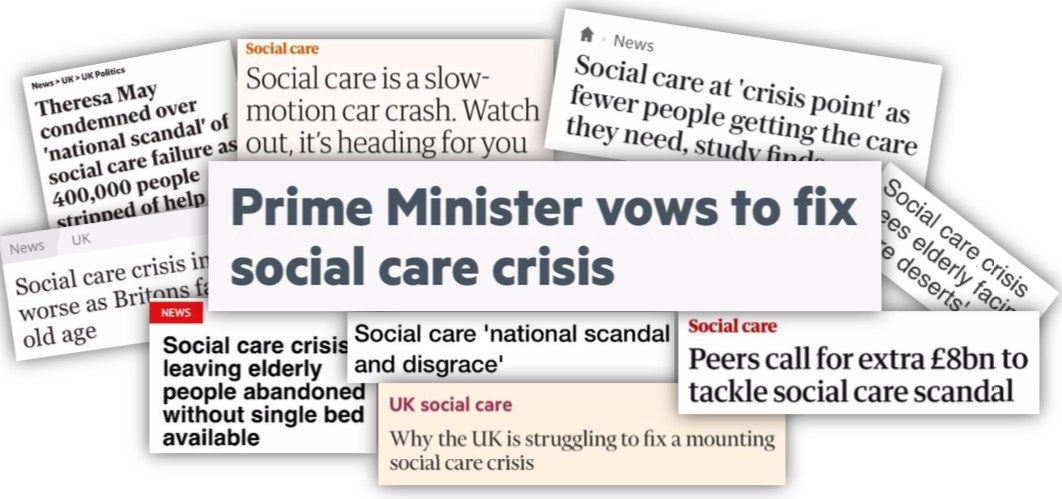Intro Series No.4: Getting hands on with the biggest topics
2 October 2019
Let's #CoproduceCare - Democratising the care debate & uncovering the hidden opportunities for people-led coproduced care.
This series of blogs will explain what coproduction is, what Coproduce Care plans to do and to explore good examples of coproduction. In blog 1 we aimed to define coproduction, blog 2 aimed to give a taster of some good moves being made by organisations to promote coproduction. Blog 3 provided a starter coproduction reading list. This, the last of our series of introductory blogs, will set out a list of the most important topics for Coproduce Care to focus on in widening the care debate.
Coproduce Care – what should we discuss?
If you’ve read our blogs, popped onto our website or had a chance to engage with our YouTube videos, you may have got the sense that Coproduce Care is passionate about opening up the care debate, democratising health and social care law and policy decision-making and supporting people to have their voices heard by health and social care leaders.
One of the ways we hope to do that is to focus on certain topics rarely discussed in any depth in regular media. Whilst our parliament is tied up in Brexit Bonanza, we’d like you to help choose themes to focus on in the health and social care debate. We have come up with some of the biggest topics we work around and would welcome ideas to add to these.
We also welcome people who we are interested in being part of a 'Coproduce Care Chat' YouTube interview, Podcast or Guest Blog, Facebook or Twitter chats and Vox Pops. This platform is for you, help make it work as well is it can.
Here is our list of themed health and social care debates. Let us know what you think...
1. Equalities and inclusion in Care
We felt it would be good to discuss how different groups who work in care are represented and supported (or not) in their careers. These include the different career experiences and desires of diverse demographics like women, men, BME, BAME, younger and older people entering and working in the healthcare sector
2. Inequalities in health and social care provision
There are some statistics that show that certain groups of people appear to be over or under represented in care services, such as black men in mental health hospitals across certain areas of the country. Other signs of inequality might include how the Solami community are worked with to engage with Autism as a condition or how black carers or the travelling community are supported.
3. LGBTQ+ community and care
4. Technology and Care
There is often a question of how and to what extent technology is a benefit or an intrusion into peoples lives within care. This might include Assistive Technology (AT), CCTV cameras, cybersecurity and the development and progress of the recently launched NHSX.
5. Integration
There is a recent history of examples of integration following the NHS long-term plan such as Strategic Transformation Partnerships, Primary Care Networks and the focus on integrating health and social care systems, and what this might look like in the future. We would like to open up the debate on this.
6. Disabilily Rights Law
7. Social-prescribing
8. Coproduction or Co-production
What is it? Who is doing it well and why is it important?
9. Workforce Development
With the advent of integrating health and social care, there is a renewed focus on comparing the social care workforce to that of health and how the social care workforce may (or may not) benefit from some of the standard benefits offered to staff working in NHS or health. This might include registration or training to 'professionalise' the workforce, workforce pay and benefits and changing the public perception (as promoted by mainstream media) of social care.
10. Government consultations
What are they? Who manages them? And how can the public and those involved in and effected by care, get involved in shaping health and social care law by engaging in government and policy consultations.
And as always...
Join us
We will be relying on a small but dedicated team and volunteers.
So, if you would like to be involved, please get in touch at hi@coproducecare.com
and help us open up the care debate, properly democratise care and please do join and share Coproduce Care:
Spread the word and uncover the hidden opportunities for people-led coproduced care
Recent Posts

We are pleased to provide an update our involvement in new projects currently being undertaken by Coproduce Care (CIC) in collaboration with Care and Support West. We will be contributing to local initiatives in Social Care Workforce Redesign, and we are excited to share the project with you. This project is running from June 2023 to June 2024. We will be working on three areas for the next 10 months all in the BNSSG region which are as follows: 1: Investigation of the Trusted Assessor Approach in Health and Social Care Systems In this project, we are investigating the Trusted Assessor Approach in health and social care systems. The objective is to demonstrate the value of Trusted Assessors in streamlining care needs assessment, while also addressing data protection and consent concerns. Case studies will be created from local regions that have implemented this approach, to provide insights into the benefits of Trusted Assessors of reducing delays in accessing required care. 2: BNSSG Opportunities for Levy Sharing and Increasing Apprenticeships in Social Care This project aims to identify opportunities for levy sharing in social care and increase the use of apprenticeships. The project will engage social care providers, training organizations, authorities, and other stakeholders to develop strategies, guidelines, and an implementation plan for utilizing the levy effectively and increasing the use of apprenticeships. 3: Integrated Health and Social Care: Enhancing Collaboration, Improving Quality, Shaping Models of Care, and the Future Social Care Workforce In this project, we are evidencing the enhanced collaboration between social care providers, health services, and local authorities. By mapping existing interfaces and collaborations, we seek to identify opportunities for cross-system benefits and improved outcomes, creating recommendations for integration for BNSSG. Our research will provide valuable insights to integration and collaboration between social care and health. At Coproduce Care (CIC), we believe that collaboration and innovation are vital for transforming social care. Through these projects, we aim to contribute to a more efficient and compassionate system. We extend our gratitude to all stakeholders, providers, commissioners, and policymakers for their invaluable support. Thank you for your continued interest in our endeavours. We will keep you updated as the projects progresses! In the meantime, if you are doing any work in any of these key areas, please get in touch with us using the below form. Thank you!

Dear Thérèse Coffey, We wish you the best of luck on your appointment as Secretary of State for Health and Social Care. Coproduce Care (CIC) is a non-profit organisation set up to democratise the social care debate. We support the voices of those working and involved in social care to influence wider decision making in the sector. Through our continued work in this area, we are writing to address some of the urgent needs of our social care workforce. We welcome your plans to set out ‘ Our plans for patients ’ to ensure our population have easier access to NHS and social care services through winter, putting the needs of patients as priority. To ensure we prioritise the health and wellbeing of our populations, and deliver the best, high-quality care possible, we need to ensure we prioritise the needs of our workforce who are at the front of delivering health and social care . To ensure both the health and wellbeing of our population and our social care workforce, we recommend the following: 1. Improving pay for social care workers, in real terms The Kings Fund published a report which compared the pay of social care workers to ten of the largest supermarkets. It found that nine out of ten supermarkets paid more than most social care roles. An example used is that if care worker left their role for a supermarket position at Tesco, they would see a 6.3% pay increase instantly. We have conducted many surveys, webinars, and connected with our audience on what is crucial to improving care workers working conditions and we have found that increasing pay is consistently the most crucial factor in reflecting the value of the work and high stress and responsibilities of the role . With the current cost of living crisis, this need for increasing pay is only getting more urgent. The sector currently has 100,000 vacancies , with extremely high levels of staff shortages. This affects the capacity to deliver services and the quality of care provided . Providers are struggling to recruit staff as they are competing with supermarkets and hospitality, sectors of which offer less stress and responsibility and more pay. We believe care workers are an invaluable part of our society and therefore should be paid accordingly. We recommend: · Introduce national pay scales that ensure care workers meet a real national living wage as a minimum . This will recognise the full contribution of social care workers make to the health of our population, and that their contribution is a real investment into our population. By increasing pay, we further increase recruitment and retention in the sector, and improve the perception of social care being a highly valuable and promising career choice. · Facilitate efforts to develop appropriate distribution of funds. Ensuring the integration and professionalisation of care is fully realised will allow better distribution of funds resulting in higher wages which better reflects the level of skill, qualifications, responsibilities and selflessness required to work within this sector. 2. Professionalising the care system Health and social care should be professionalised to encourage staff retention, career progression and further skill development. Professionalising care work would ensure that those working in the sector are valued and are provided with the necessary tools to provide high quality care. Currently, there is no accredited qualification for social care workers, without a standardised training process. We hosted a live stream with Gillian Keegan , who mentioned the government’s intention to create a voluntary digital care workforce hub, as well as a skill passport for all Health & Social Care workers. This is understood to allow easier identification of the workforce, including the possibility to share resources and opportunities to encourage the workforce to up-skill and develop. The skills passport would help keep track of the skills care workers have demonstrated over time, meaning career progression would be easier to identify . Whilst individual action is very important, to improve the quality of care, we urge for a standardised career and training development program for all care staff that results in an accredited qualification . We recommend: · Adequate pay to restore and recognise social care work as a valued profession . Extensive skills are involved in care work, and if standardised training and qualifications are implemented, security of applicable income is appropriate to these expectations. By increasing pay, care work has higher professional footing as a recognised career and role. · Ensuring the integration of social care is fully realised . The high fragmentation of the care sector and its lack of integration with NHS services makes it challenging to implement standardised training . The governments white paper ‘ Health and social care integration: joining up care for people, places and population ’ seeks the ambition to join up social care services. We welcome this white paper and its integration policy to achieve higher quality of care and better health outcomes. This ambition requires effort and commitment to the integration at all levels, and we hope that as health secretary, fully putting this policy into practice and reaching its scope, goals, and purpose is your focus in your new role. · Implementing standardised training, improved learning outcomes for workers, including IT, literacy, and numeracy training are addressed with sensitivity and with the voices of the workers at heart . Implementing standardised training would ensure a level of professionalism across the sector, however, must go in line with the security of increased income and security of hours of work. We must protect the wellbeing of our workforce, of which is already experiencing burn-out and exhaustion from the high pressures the sector is facing. We cannot have higher expectations of our workers undertaking standardised training without adequate pay . We hope you agree with our recommendations and seek to ensure we continue to improve the working conditions for our social care workforce. We hope that within your post as the new Health and Social Care Secretary, you prioritise the voices of those most impacted by decision making regarding the sector. Thank you for taking the time to read this letter, CoProduce Care Written by: Gabriella Neal


